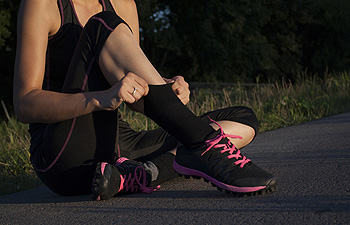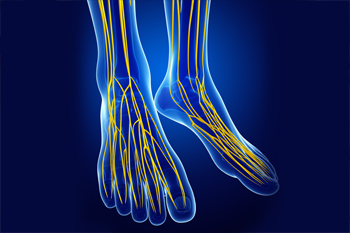
 If you’ve ever been shopping for running shoes, you’ve likely noticed that shoe sizes are not standardized. This means that you may be a size 10 in one brand and a size 9 in another brand. Sometimes, shoe sizes are not even standardized within the same brand, meaning each individual pair of shoes will have its own unique fit. Because of this, it is suggested that you shop in a brick and mortar store if possible. This way, you can try on shoes before you buy them. When buying running shoes, you should buy shoes that leave a thumb’s width of space between the end of your longest toe and the front of the shoe, as your feet expand while running. For more information on how to find the right size shoes, please consult with a podiatrist.
If you’ve ever been shopping for running shoes, you’ve likely noticed that shoe sizes are not standardized. This means that you may be a size 10 in one brand and a size 9 in another brand. Sometimes, shoe sizes are not even standardized within the same brand, meaning each individual pair of shoes will have its own unique fit. Because of this, it is suggested that you shop in a brick and mortar store if possible. This way, you can try on shoes before you buy them. When buying running shoes, you should buy shoes that leave a thumb’s width of space between the end of your longest toe and the front of the shoe, as your feet expand while running. For more information on how to find the right size shoes, please consult with a podiatrist.
Getting the right shoe size is an important part of proper foot health. Seek the assistance of the podiatrists from The Foot & Ankle Center of New Jersey. Our doctors will provide the care you need to keep you pain-free and on your feet.
Getting the Right Shoe Size
There are many people who wear shoes that are the incorrect size, negatively affecting their feet and posture. Selecting the right shoes is not a difficult process, so long as you keep several things in mind when it comes to choosing the right pair.
As our feet hold our body weight and keep us moving, it is important to treat them right. Picking the right pair of shoes can provide your feet comfort and mobility without pain.
If you have any questions, please feel free to contact our office located in Paramus, NJ . We offer the newest diagnostic and treatment technologies for all your foot care needs.
 Pinched nerves occur when excessive pressure is placed on a nerve by the surrounding tissues. This can happen in the feet due to an injury, from wearing poorly fitted shoes, or from having flat feet, bone spurs, or arthritis, among many other possible causes. A pinched nerve can cause a variety of symptoms, including aching, sharp, or burning pain, numbness, tingling, or a “pins and needles” sensation in the affected foot, along with muscle weakness. The symptoms can occur on the bottom of your foot, at your heel, or in the ball of your foot. Nerve pain may radiate out to the arch or toes. To learn more about pinched nerves in the feet, please consult with a podiatrist.
Pinched nerves occur when excessive pressure is placed on a nerve by the surrounding tissues. This can happen in the feet due to an injury, from wearing poorly fitted shoes, or from having flat feet, bone spurs, or arthritis, among many other possible causes. A pinched nerve can cause a variety of symptoms, including aching, sharp, or burning pain, numbness, tingling, or a “pins and needles” sensation in the affected foot, along with muscle weakness. The symptoms can occur on the bottom of your foot, at your heel, or in the ball of your foot. Nerve pain may radiate out to the arch or toes. To learn more about pinched nerves in the feet, please consult with a podiatrist.
Foot Pain
Foot pain can be extremely painful and debilitating. If you have a foot pain, consult with the podiatrists from The Foot & Ankle Center of New Jersey. Our doctors will assess your condition and provide you with quality foot and ankle treatment.
Causes
Foot pain is a very broad condition that could be caused by one or more ailments. The most common include:
Diagnosis
To figure out the cause of foot pain, podiatrists utilize several different methods. This can range from simple visual inspections and sensation tests to X-rays and MRI scans. Prior medical history, family medical history, and any recent physical traumatic events will all be taken into consideration for a proper diagnosis.
Treatment
Treatment depends upon the cause of the foot pain. Whether it is resting, staying off the foot, or having surgery; podiatrists have a number of treatment options available for foot pain.
If you have any questions, please feel free to contact our office located in Paramus, NJ . We offer the newest diagnostic and treatment technologies for all your foot care needs.
Morton’s neuroma is a condition in which a nerve between your toes becomes irritated or thickened. This can cause symptoms such as stabbing, shooting, or burning pains in the front of the foot. Tingling, numbness, and a sensation akin to a small pebble being stuck under your foot may be experienced as well. If you have Morton’s neuroma, certain modifications can help reduce your symptoms. These can include wearing wide, comfortable shoes with a low heel, reducing activities like running, which may exacerbate the pain, and losing weight to reduce the amount of pressure put on the foot. Taking over-the-counter anti-inflammatory drugs and wearing orthotic inserts may also help relieve pain. If you are experiencing the symptoms of Morton’s neuroma, it is suggested that you consult with a podiatrist.
Morton’s neuroma is a very uncomfortable condition to live with. If you think you have Morton’s neuroma, contact the podiatrists of The Foot & Ankle Center of New Jersey. Our doctors will attend to all of your foot care needs and answer any of your related questions.
Morton’s Neuroma
Morton's neuroma is a painful foot condition that commonly affects the areas between the second and third or third and fourth toe, although other areas of the foot are also susceptible. Morton’s neuroma is caused by an inflamed nerve in the foot that is being squeezed and aggravated by surrounding bones.
What Increases the Chances of Having Morton’s Neuroma?
Morton’s neuroma is a very treatable condition. Orthotics and shoe inserts can often be used to alleviate the pain on the forefront of the feet. In more severe cases, corticosteroids can also be prescribed. In order to figure out the best treatment for your neuroma, it’s recommended to seek the care of a podiatrist who can diagnose your condition and provide different treatment options.
If you have any questions, please feel free to contact our office located in Paramus, NJ . We offer the newest diagnostic and treatment technologies for all your foot care needs.
 In our youth, we are often able to just get back up again following a fall. This is not always the case as we age. Seniors are more likely to suffer falls than younger adults, with one in three seniors experiencing a serious fall every year. Among many other complications, these falls can result in injuries to the legs, ankles, and feet that can severely limit an elder’s mobility and overall quality of life. There are multiple risk factors that increase the likelihood of falling as we age, including having decreased strength, poor coordination, limited mobility, reduced eyesight, hearing loss, stiff joints, health complications, cognitive disorders, and taking multiple medications. Falls among the elderly can have serious and potentially life-threatening consequences, making fall prevention an important goal. For information about measures you can take to help prevent falls, please consult with a podiatrist.
In our youth, we are often able to just get back up again following a fall. This is not always the case as we age. Seniors are more likely to suffer falls than younger adults, with one in three seniors experiencing a serious fall every year. Among many other complications, these falls can result in injuries to the legs, ankles, and feet that can severely limit an elder’s mobility and overall quality of life. There are multiple risk factors that increase the likelihood of falling as we age, including having decreased strength, poor coordination, limited mobility, reduced eyesight, hearing loss, stiff joints, health complications, cognitive disorders, and taking multiple medications. Falls among the elderly can have serious and potentially life-threatening consequences, making fall prevention an important goal. For information about measures you can take to help prevent falls, please consult with a podiatrist.
Preventing falls among the elderly is very important. If you are older and have fallen or fear that you are prone to falling, consult with the podiatrists from The Foot & Ankle Center of New Jersey. Our doctors will assess your condition and provide you with quality advice and care.
Every 11 seconds, an elderly American is being treated in an emergency room for a fall related injury. Falls are the leading cause of head and hip injuries for those 65 and older. Due to decreases in strength, balance, senses, and lack of awareness, elderly persons are very susceptible to falling. Thankfully, there are a number of things older persons can do to prevent falls.
How to Prevent Falls
Some effective methods that older persons can do to prevent falls include:
Falling can be a traumatic and embarrassing experience for elderly persons; this can make them less willing to leave the house, and less willing to talk to someone about their fears of falling. Doing such things, however, will increase the likelihood of tripping or losing one’s balance. Knowing the causes of falling and how to prevent them is the best way to mitigate the risk of serious injury.
If you have any questions, please feel free to contact our office located in Paramus, NJ . We offer the newest diagnostic and treatment technologies for all your foot care needs.